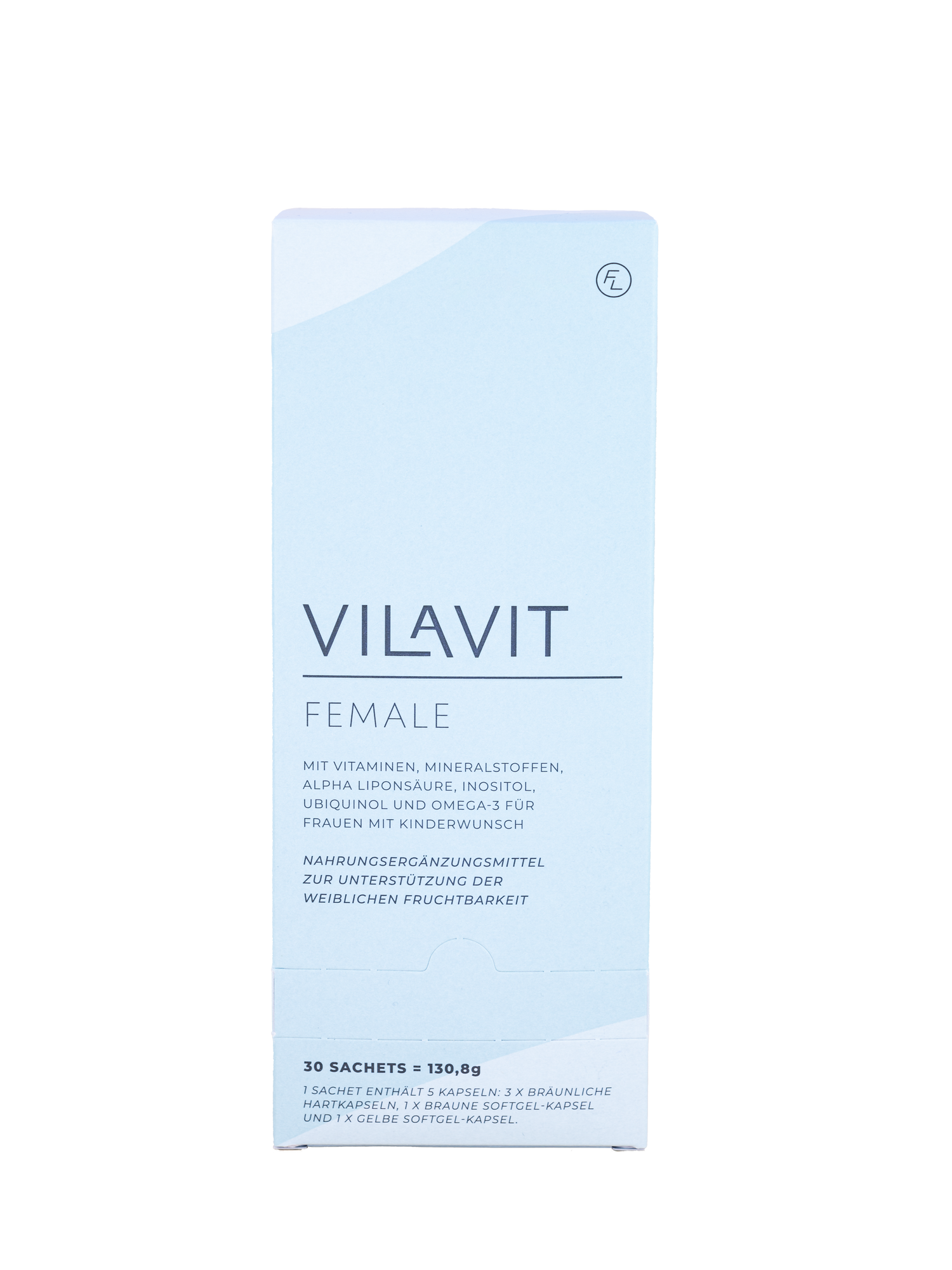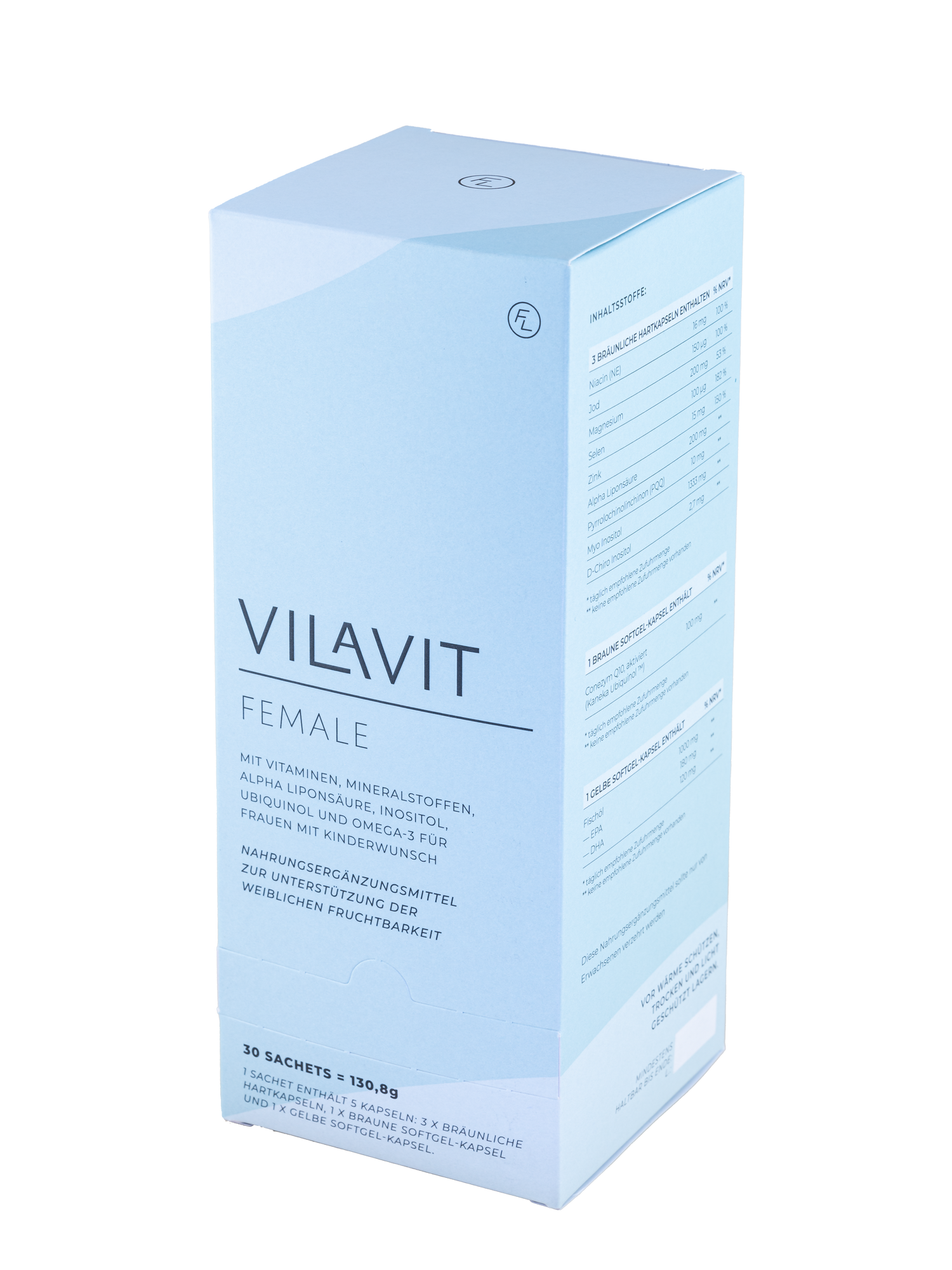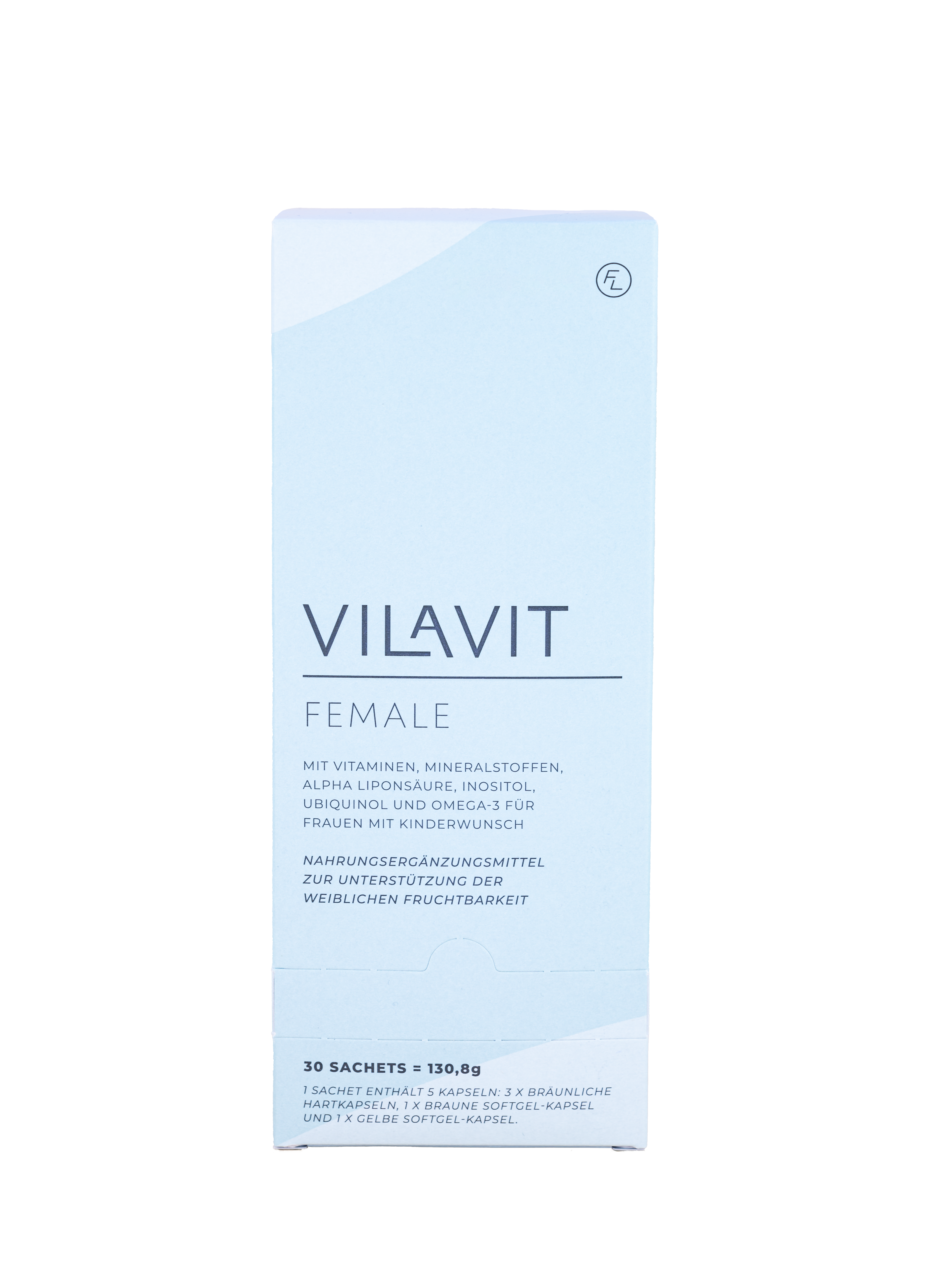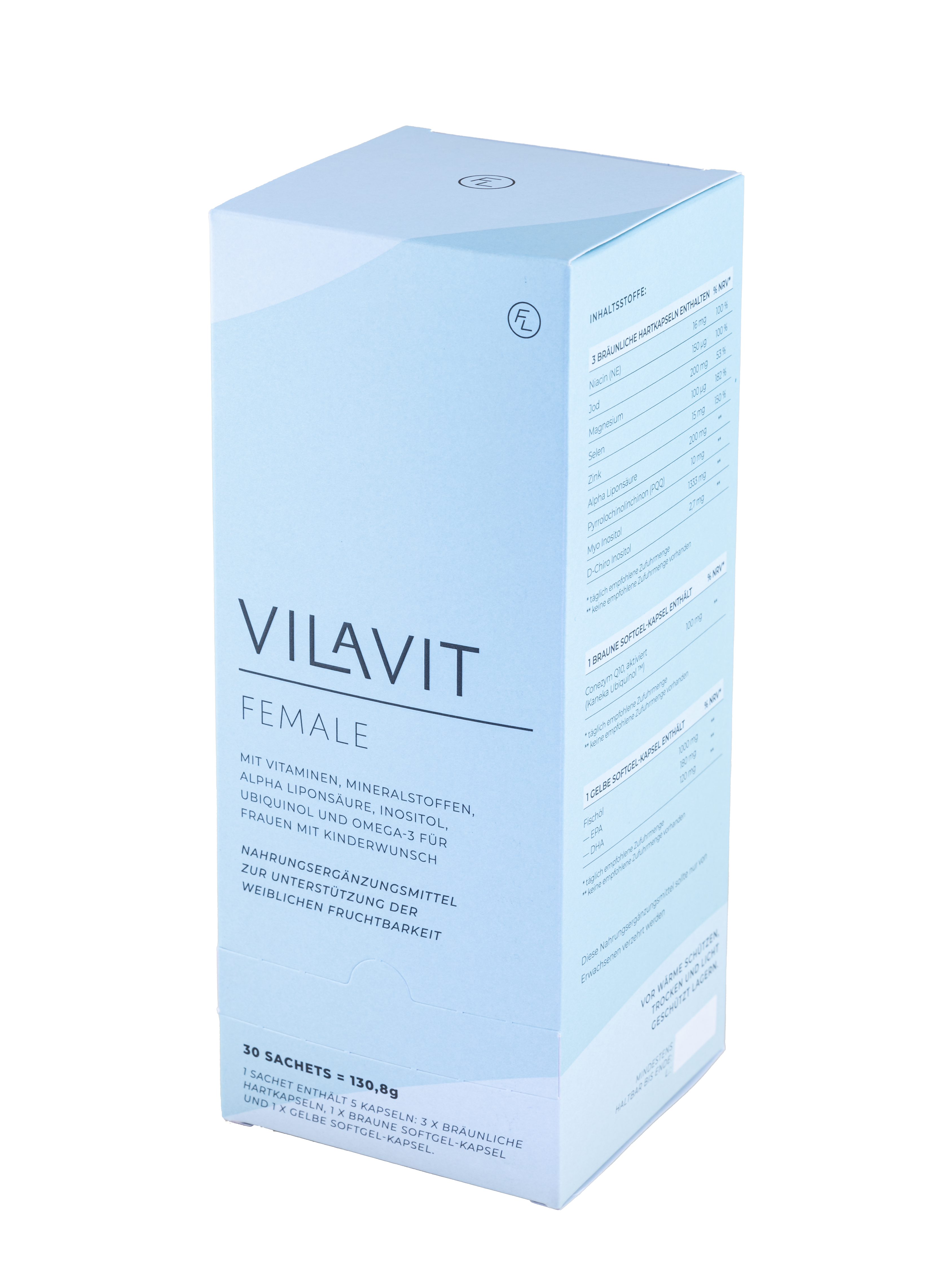Pregnancy is a time when the body of the expectant mother undergoes true peak performance. With pregnancy comes an increased need for nutrients and energy. Taking the right nutrients during this period is crucial for the optimal development of the baby and the well-being of the mother.
The German Nutrition Society (DGE) recommends the following daily amounts for pregnant women:
| Pregnancy Vitamins and Nutrients |
Recommended daily dose (Combination of food and supplements) |
|
Vitamin A |
800 RE |
|
Vitamin B1 |
1,2 - 1,3 mg |
|
Vitamin B2 |
1,3 - 1,4 mg |
|
Vitamin B6 |
1,5 -1,8 mg |
|
Vitamin B12 |
4,5 mcg |
|
Vitamin C (ab dem 4. Monat) |
105 mg |
|
Vitamin D3 |
20 mcg |
|
Vitamin E |
13 mg |
|
Docosahexaensäure (DHA) |
200 mg |
|
Eisen |
30 mg |
|
Folsäure |
550 mg (+ 400 mcg als Nahrungsergänzungsmittel) |
|
Jod |
230 mcg |
|
Calcium |
1000 mg |
|
Magnesium |
310 mg |
Effects of Key Nutrients during Pregnancy
Folic Acid: For cell division and prevention of neural tube defects
Folic acid plays a crucial role in cell division and growth. It supports the formation of the neural tube in the fetus, a precursor structure of the nervous system. Adequate levels of folic acid can reduce the risk of birth defects, especially neural tube defects. Since about 50% of women cannot absorb folic acid, the intake of the bioavailable form, folate, is recommended.
Food sources: Green leafy vegetables like spinach, broccoli, whole grains, legumes, avocado.
Iron: For blood formation and oxygen transport
Iron requirements increase during pregnancy as the body produces more blood to supply the growing baby. Iron is also essential for oxygen transport in the body. Regular monitoring of iron levels by a doctor during pregnancy is recommended to adjust iron supplementation if needed.
Food sources: Red meat, legumes, leafy vegetables like spinach.
Vitamin D: For the immune and nervous systems & bone development
Vitamin D, the so-called sunshine vitamin, is essential for a healthy immune system, nervous system, and placental development. It supports the absorption of calcium, contributing to the development of the baby's bones and teeth.
Food sources: Fatty fish, eggs, dairy products, avocado.
Omega-3 Fatty Acids (DHA): For brain and vision development
DHA, a component of omega-3 fatty acids, is crucial for the development of the unborn child's brain and vision. While most pregnancy vitamins offer omega-3 from the second trimester onwards, it is advisable to start taking omega-3 from the beginning of pregnancy.
Food sources: Fatty fish like salmon, mackerel, sardines, walnuts, flaxseeds, rapeseed oil.
Iodine: For the central nervous system
Iodine supports the development of the thyroid and the overall healthy and mental development of the child. Individuals with thyroid issues should discuss iodine supplementation with their doctor.
Food sources: Seafood, sea fish, iodized table salt, dairy products, eggs.
Vitamin B-Complex:
Vitamins of the B-group play numerous roles during pregnancy:
- Vitamin B1 (Thiamine): For metabolism, the heart, kidneys, and the nervous system.
- Vitamin B2 (Riboflavin): For blood formation and the development of the nervous system.
- Vitamin B3 (Niacin): For brain development and the formation of the nervous system.
- Vitamin B6 (Pyridoxine): For the immune system, cell division, and growth.
- Vitamin B12 (Cyanocobalamin): For blood formation and the development of the nervous system.
Vegan Diet and Pregnancy Vitamins:
Women following a vegetarian or vegan diet may struggle to absorb certain vitamins and nutrients. Therefore, supplementing vitamin B12, omega-3 fatty acids (DHA), zinc, iron, and iodine is crucial.
Vitamin B12, exclusively derived from animal products, is essential for preventing hematological and neurological issues in pregnant mothers, along with potential permanent damage to the child's nervous system. Thus, vitamin B12 supplementation is particularly important in a vegan diet.
Another vital nutrient often lacking in the diets of vegans or vegetarians is docosahexaenoic acid (DHA), a component of omega-3 fatty acids.
For those following a vegan or vegetarian diet, consulting an expert to assess individual nutrient needs is recommended.
Taking Pregnancy Vitamins
How to take pregnancy vitamins: We recommend taking them with a meal and a glass of water. Especially for those experiencing pregnancy-related nausea, combining a small meal with vitamin intake is advisable.
When to start taking pregnancy vitamins: It is crucial to begin taking pregnancy vitamins early in pregnancy or upon receiving a positive pregnancy test. We recommend the intake of high-quality prenatal vitamins to improve egg cell quality and elevate folic acid levels to the required amount before the onset of pregnancy.
Which pregnancy vitamins to take: It is essential to focus on high-quality chemical compounds in their bioavailable form, as these are the only ones the body can absorb. A critical example is taking folate instead of folic acid.















